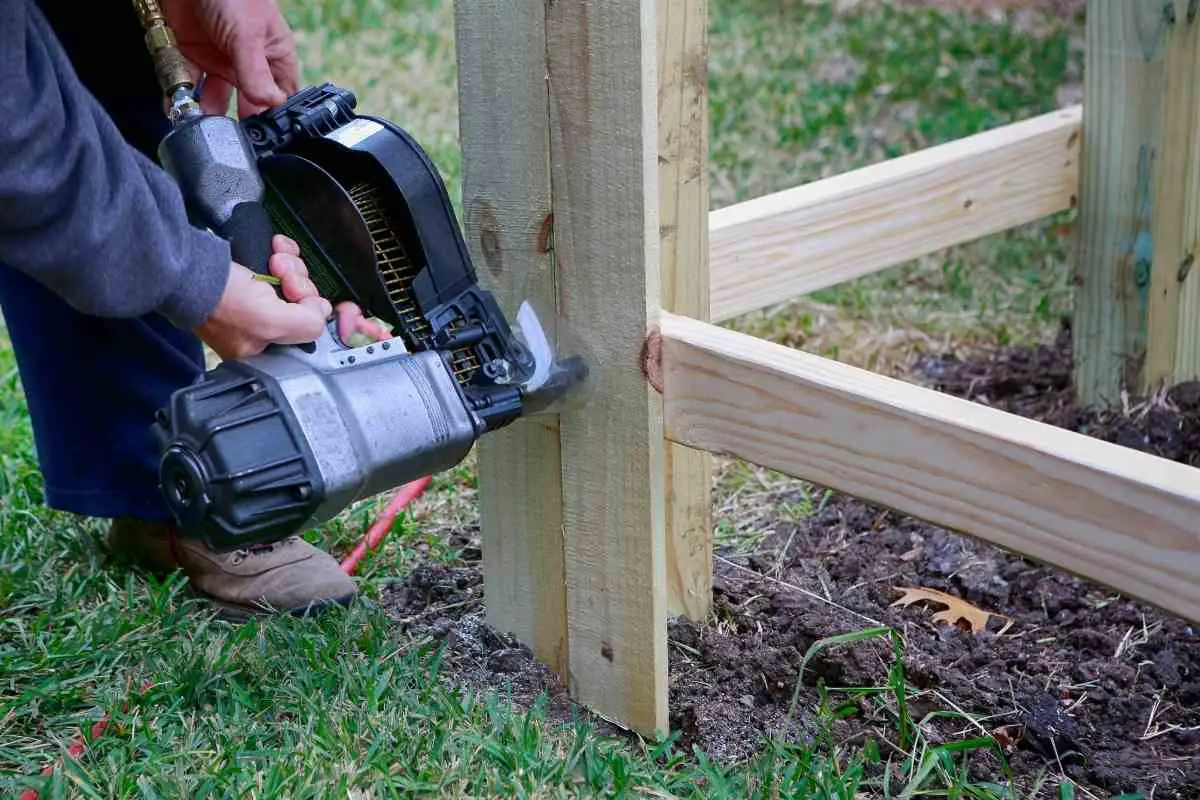Getting a fence up in your backyard should be a once-in-a-decade event, so you want to be sure that you erect your fence with the right materials and expertise.
Your choice of nails for fence pickets may seem like a small detail but it can really affect the resilience and longevity of your build.
With so many types and sizes of nails to choose from, how do you know which one is going to be up to the job?
In This Article – We share the best size nails for fence pickets, helping you to find the correct hardware you need to secure fence pickets for a robust fence.
We’ve also included some of the best fence nails and screws on the market, which should be able to handle even the thickest pickets and horizontal rails while leaving your new fence looking smart.
Selecting the right nails for fence pickets
The picket fence is the classic, all-American fence.
It’s simple, reliable, and easy to erect.
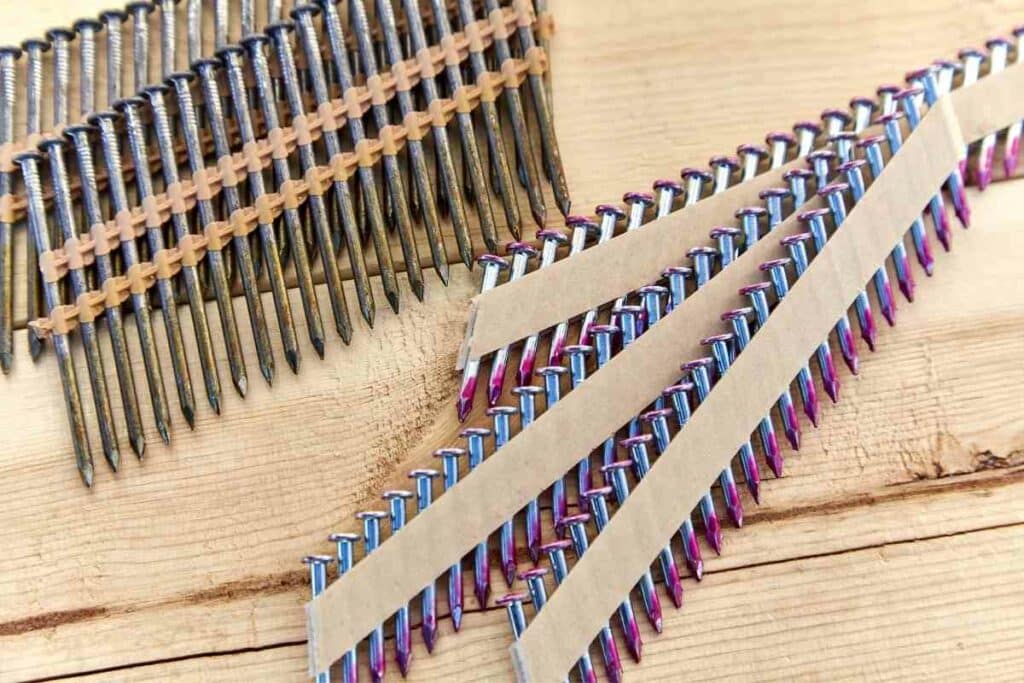
After inserting your fence posts and horizontal rails, you want a reliable nail that will hold your individual fence pickets to the rails for a great finish.
Here are the key considerations.
The thickness of the fence picket
The type of nails your use will depend on the thickness of your fence pickets.
The thickness of your wooden pickets determines how strong and durable your fence will be.
Thinner 1/2 -inch boards are cheaper but will not last as long.
Most fence pickets are ⅝-inch thick with ¾ to 1-inch thick pickets being premium.
The thickness of the horizontal rails
A decent picket fence uses standard two-by-fours that are also nailed to the erect fence posts.
The thickness of the fence post matters as you’ll want your nails to penetrate the fence post by at least ¾ inch for a reliable hold.
At a minimum, you should have a top and bottom rail, with an additional rail for every 24-inches in post height, so if you are installing a six-foot fence, you’ll need three rails.
Are you using power tools?
Installing fencing is a great reason to get out the power tools and a nail gun will undoubtedly get the job done quickly.

However, you need a nail gun that can handle the caliber of nails that you’ll need for fencing.
This is usually either:
- A coil siding nail gun: a coil siding nailer uses nails that are between 11/4-inch up to 21/2 inches. Siding nailers are primary for installing sidings so have a relatively superficial hold.
or
- A framing gun: framing nailers are the type you use to build houses and carry much larger nails, up to 3 ½ inches or more. A framing nailer will drive the nails deeply into the wood with the holding power necessary to support a building.
The best size nail for your picket fence is at least 2 inches
Nail length
A 2-inch nail, known as a 6D nail is the minimum you should be working with if you want pickets firmly attached.
With 2 inches you have just enough length to go through a decent picket and into the horizontal rail without going all the way through it.
Nail gauge
Selecting nails with the right gauge is key to getting a good hold on your fence.
You’ll need at least a 15-gauge nail (0.072-inch diameter), with thicker gauges as 14 or even 12-gauge (0.1-inch diameter) being suitable for fencing.
3 of the best nails for nailing a picket fence
Here are some great examples of suitable nails for nailing your picket fence by hand or with a nailer.
1. NAILPRO 2″ x 15 Gauge Angled Finish Nails to fit Bostitch Nailers
Specification
- Material: stainless steel
- Length: 2 inches
- Gauge: 15 Gauge
- Point: Chisel
- Head: T-style
Description
This 1000-unit pack of stainless steel nails is a suitable length and gauge for securing most pickets.
The stainless steel is corrosion resistant, making them ideal for long-term outdoor installation.
You can use these nailers with Bostitch and other leading brands of nail gun.
Pros and Cons
These nails come glued onto a continuous strip for easy loading into the nailer. However, if you store them for a long period, the glue can deteriorate, leaving you with individual nails.
2. Senco DA25EPB 15 Gauge by 2-1/2 inch Length Bright Basic Finish Nails
Specification
- Material: galvanized
- Length: 2 ½ inches
- Gauge: 15 Gauge
- Point: Chisel
Description
These nails are a versatile choice for nailing pickets and other home improvement purposes.
The 2 ½ inch length is ideal for thick pickets and rails and a 3,000 pack is great value for money.
Each nail is extremely well-galvanized with a special lubricated coating that prevents the misfiring of the nail and adhesive for a secure hold to the wood once it is driven.
Pros and Cons
These nails are specially prepared to prevent countersinking and misfiring.
They work well in a variety of nailers. One con is that they are described as being stainless, but they are actually double hot-dipped galvanized nails.
3. DEWALT Angled Finish Nail
Specification
- Material: galvanized
- Length: 2 inches
- Gauge: 15 Gauge
- Point: Chisel
Description
DeWalt is a quality brand and you’ll find that this bumper pack of 2500 nails will work with a variety of nailers for fencing and other outdoor jobs.
The nails are either hot-dipped galvanized or electro-coated for a corrosion-free installation.
Pros and Cons
These DeWalt nails are a great choice for nailing pickets with reliable performance and little misfiring.
Last-minute considerations for nailing your picket fence
The specific materials you choose for your fence determine the exact fence picket length and gauge you choose.
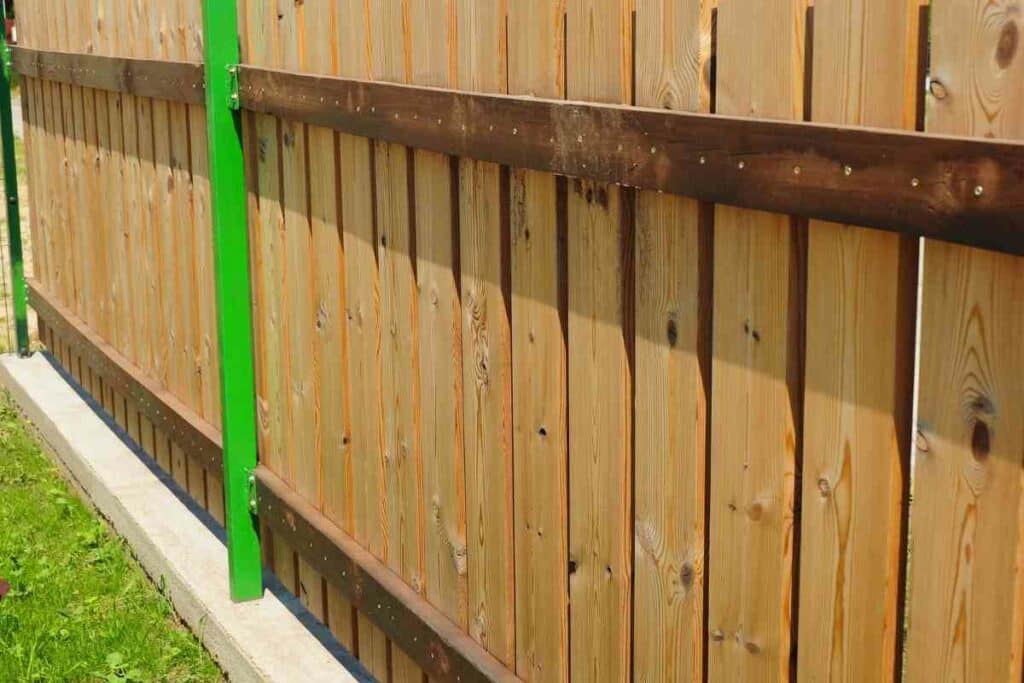
Here are some quick pointers for getting things exactly right:
- Remember that the pickets and the backing horizontal rail will determine the best nail length and gauge. A 2-inch/6D nail is ideal if you use the standard ⅝-inch picket with 2 x 4 rails but if you go thicker on the rail or the picket, you will need a longer and thicker nail – 2 ½ inches or more.
- The nail need to make it at least halfway into the rail for a reliable hold that will withstand the worst your weather throws at the fence. Resist the temptation to get extra-long nails as they could go straight through the rail. If the nails fully penetrate your railing, you could end up with hundreds of sharp points along the fence length, which are likely to become rusty.
- The weight and density of your wood also matter. Quality hardwood is great for a durable fence that won’t swell or rot with time but you’ll need to make sure that your nails are long and have a sufficient gauge to take their weight. A thin nail is too weak and will simply bend under the weight of the picket, causing your fence to deteriorate.
Look for wood that won’t split when you drive the nail in.
The last thing you need is a split picket.
Splitting is more likely with thicker nails, especially if your wood is super hard.
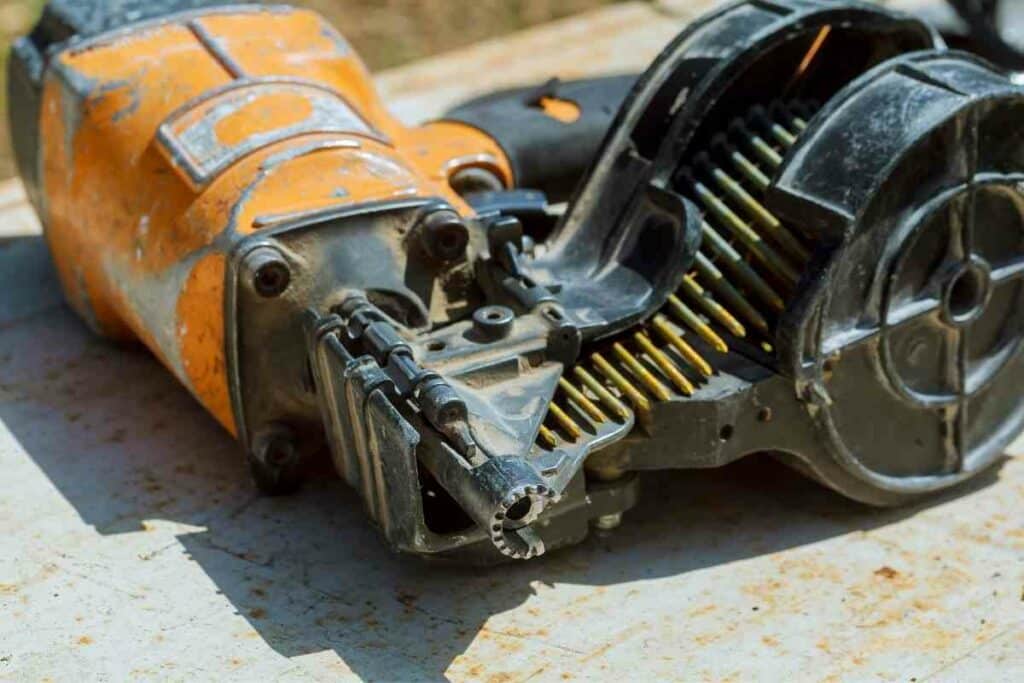
Here are some of the best wood choices for picket fences and the guage of nail that is best:
- Cedar: Cedarwood contains acids that can react with the nail and cause corrosion staining so opt for stainless steel, hot-dipped galvanized or polymer-coated fasteners.
- Douglas Fir: has great nail and screw-holding properties – double dipped galvanized nails are a common choice.
- Cypress: the best nails for cypress include ring-shank, or spiral-shank hot-dip galvanized nails.
- Redwood: The best nails for a redwood fence are stainless steel nails which will resist corrosion.
Using a nailer makes erecting fence pickets easier and quicker with more consistent results.
The nailer you use needs to be powerful enough to drive a 2-inch nail of sufficient gauge, making a framing gun the better choice.
You also need to think about how visible you want your fence nails to be. Thick nails will be visible, but the fence will be secure and you can always paint over them.
Make sure that your nails are hot-dipped galvanized or stainless steel. This prevents the nails from rusting and creating unsightly bleed staining on your wood.
There are also some reliable alternatives to nails for attaching your fence pickets
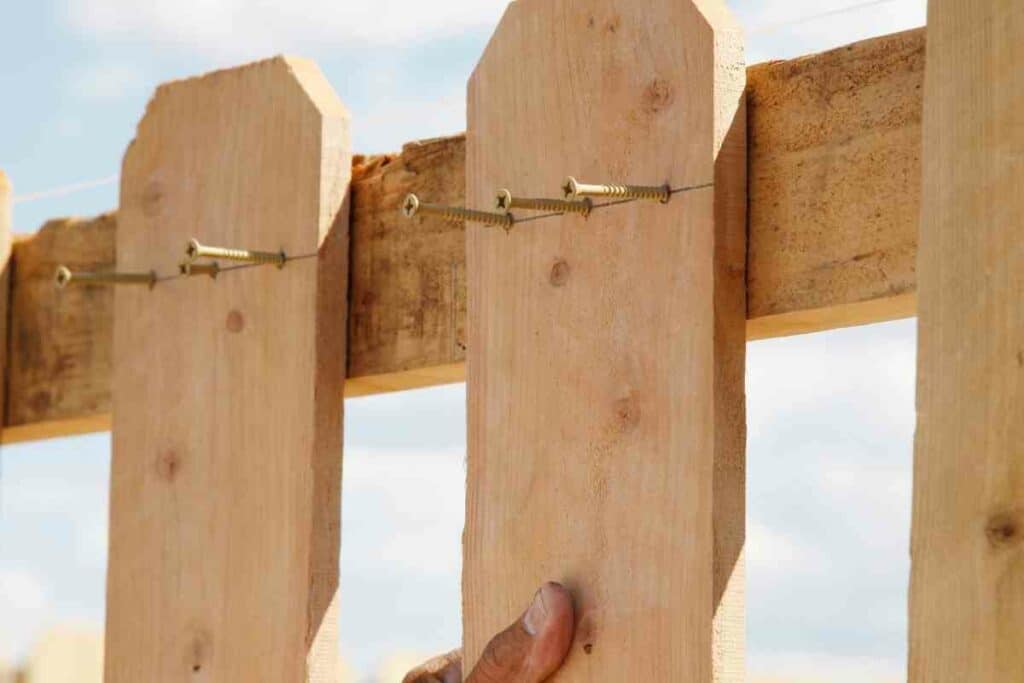
There are other ways to secure your pickets if the nails you need aren’t available.
Here are two options for building a great fence.
Staples
Heavy-duty fence staples can be an effective solution for securing your picket if your fencing is relatively thin (approx. ½ inch thickness).
A quarter-inch crown stapler should do the job. Using a staple gun is powerful and convenient but staples provide only so much hold.
Pros advise adding one or two extra staple to reinforce the picket.
Screws
Driving screws may be time-consuming, but they provide an extremely secure hold.
Many professional fencing contractors will screw the railings to the posts to secure them reliably. The threading of the screws holds the wood better than nails.
Screws have the added benefit of being easier to remove if you need to readjust the picket or replace one that has become damaged.
Rounding up
As you can see, finding ideal nails for your fencing job is relatively straightforward.
If you are unsure about what will work on your fence, test different lengths and gauges of nails on one or two pickets, and once you have a good fix, you’re ready to go!
